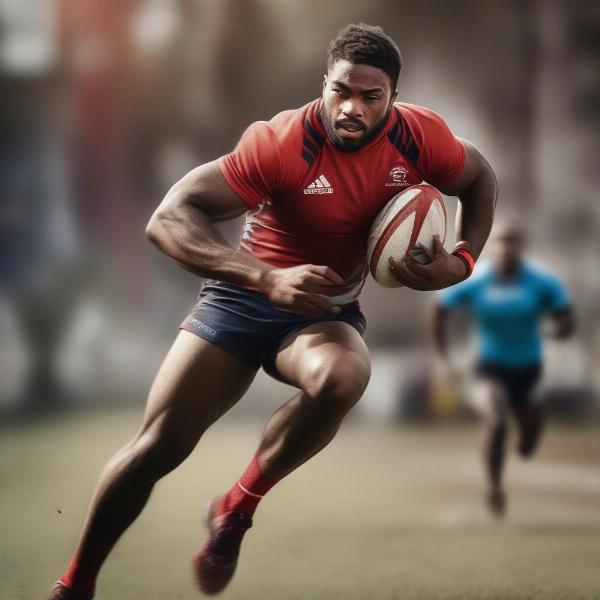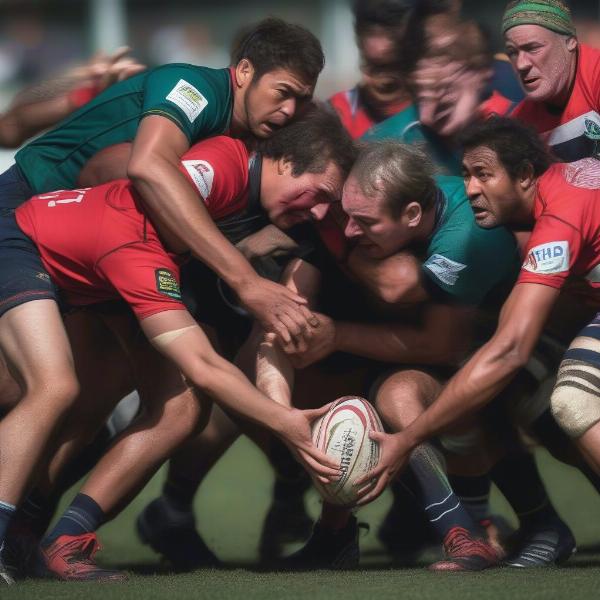A quick Google search will tell you that a rugby sevens game is shorter than a traditional rugby union match. But exactly How Long Does A Rugby Sevens Game Last? Let’s delve into the specifics and uncover some fascinating details about this fast-paced, dynamic sport.
Understanding Rugby Sevens Game Duration
The standard length of a rugby sevens game is 14 minutes, split into two halves of 7 minutes each. This concise timeframe contributes to the sport’s explosive nature, demanding both incredible fitness and tactical prowess from the players. However, there’s a slight exception. In the final of a tournament, the match extends to 20 minutes, with two 10-minute halves, to allow for a more conclusive showdown. This added time creates even more drama and excitement, providing a fitting climax to a hard-fought competition.
What About Halftime in Rugby Sevens?
Even with the shorter game length, players still need a breather. Halftime in rugby sevens is remarkably short, typically lasting only one minute, sometimes extending to two minutes at most. This brief respite allows teams to regroup, adjust their strategies, and rehydrate before diving back into the action-packed fray. The limited halftime further emphasizes the fast-paced, continuous nature of rugby sevens, minimizing downtime and maximizing the thrill for spectators.
How Does This Compare to Rugby Union?
For comparison, a standard rugby union match is 80 minutes long, divided into two 40-minute halves. This significant difference in game duration highlights the contrasting physical demands and strategic approaches between the two formats. While rugby union rewards endurance and strategic depth, rugby sevens prioritizes speed, agility, and quick thinking. You can learn more about the length of a rugby union match on our blog post: how long is a game of rugby.
Stoppages and Extra Time in Rugby Sevens
Similar to rugby union, the clock in rugby sevens stops for serious injuries and other significant interruptions. However, the referee has the discretion to keep the clock running for minor stoppages, contributing to the overall flow and speed of the game. In the event of a tie at the end of regulation time in a knockout match, extra time is played. This consists of sudden death, meaning the first team to score any points wins. Extra time periods are typically 5 minutes long, ensuring a decisive outcome and adding a layer of intensity to already thrilling contests.
The Impact of Shorter Game Time on Strategy
The shorter game duration significantly impacts the strategic approach in rugby sevens. Teams must prioritize quick ball movement, exploiting gaps in the defense, and capitalizing on every scoring opportunity. The limited time necessitates efficient decision-making, emphasizing the importance of both individual brilliance and cohesive teamwork.
 Rugby Sevens Game Duration: A Visual Guide
Rugby Sevens Game Duration: A Visual Guide
Fitness Levels and Rugby Sevens
The fast-paced nature of rugby sevens demands exceptional fitness from its players. They must be able to sprint repeatedly, cover vast distances, and maintain high intensity throughout the match. This requires rigorous training regimes focused on both cardiovascular endurance and explosive power.
Why is Rugby Sevens So Fast-Paced?
The reduced number of players (seven instead of fifteen) on a larger pitch creates more space and opportunities for attacking play. This, combined with the shorter game duration, leads to a much faster and more dynamic game compared to traditional rugby union.
 Rugby Sevens Player Sprinting with the Ball
Rugby Sevens Player Sprinting with the Ball
Variations in Game Length
While the standard game length is 14 minutes, there can be variations depending on the specific competition or tournament format. For instance, some youth or amateur competitions might have shorter games to accommodate different age groups and skill levels.
The Excitement of Rugby Sevens
The fast-paced, dynamic nature of rugby sevens makes it a thrilling sport to both play and watch. The short game time ensures continuous action, minimizing lulls and maximizing excitement. Every moment counts, and the potential for dramatic comebacks and last-minute victories keeps spectators on the edge of their seats. “The condensed format creates a real pressure cooker environment,” says former England Sevens captain, Simon Amor. “Every decision, every pass, every tackle carries immense weight.”
 Rugby Sevens Players Competing for the Ball
Rugby Sevens Players Competing for the Ball
Frequently Asked Questions (FAQs)
1. How long is a rugby sevens half?
A rugby sevens half is typically 7 minutes long.
2. How long is extra time in rugby sevens?
Extra time in rugby sevens is generally 5 minutes and is played as sudden death.
3. Why is a rugby sevens final longer?
The final is extended to 20 minutes (two 10-minute halves) to provide a more conclusive result in the most important match of the tournament.
4. Is rugby sevens more physically demanding than rugby union?
While both are physically demanding, rugby sevens requires a different type of fitness, emphasizing speed and agility over the endurance required in rugby union.
5. How long is halftime in rugby sevens?
Halftime in rugby sevens is very short, typically one to two minutes.
6. How does the game length of rugby sevens impact strategy?
The short game time necessitates quick thinking, efficient ball movement, and a focus on exploiting space.
Conclusion
So, how long does a rugby sevens game last? Typically, it’s 14 minutes (two 7-minute halves) with a short halftime, but finals are extended to 20 minutes. This short, sharp format creates an exciting and dynamic spectacle that has captivated audiences worldwide. So, next time you’re looking for a fast-paced sporting experience, consider checking out a rugby sevens match! Share this article with your fellow rugby enthusiasts and let’s spread the word about this electrifying sport.

